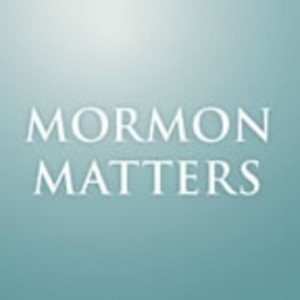 In May there was a very enlightening episode of the podcast Mormon Matters about LDS film, hosted by Dan Wotherspoon, the former editor of Sunstone, and featuring panelists Arthur Van Wagenen, head of Excel Entertainment (Deseret Book’s film arm), Sterling Van Wagenen, co-founder of the Sundance Film Festival and the Sundance Institute, filmmaker, teacher, and former administrator in several LDS film and television organizations, and Stephen Carter, writer, editor, filmmaker, and the current editor of Sunstone.
In May there was a very enlightening episode of the podcast Mormon Matters about LDS film, hosted by Dan Wotherspoon, the former editor of Sunstone, and featuring panelists Arthur Van Wagenen, head of Excel Entertainment (Deseret Book’s film arm), Sterling Van Wagenen, co-founder of the Sundance Film Festival and the Sundance Institute, filmmaker, teacher, and former administrator in several LDS film and television organizations, and Stephen Carter, writer, editor, filmmaker, and the current editor of Sunstone.
While I recommend the entire podcast, this post is a summary of the first part, where Sterling and his son Arthur outline the three major Church-owned entities that are involved in creating or distributing film content: the Church Publishing Services Department, BYU Broadcasting, and Excel Entertainment (a division of the Deseret Book Company). It is a useful primer on the media divisions within the Church, and what their missions are. I added a few facts here and there as well.
The Mormon Matters website says, “This episode features a fantastic conversation on film and the many roles it plays in human lives and communities, especially religious ones. Along the way it wrestles with the tensions that are always present in films for niche audiences, especially when filmmakers try to tell compelling stories while at the same time hoping to make money, which often means making many decisions based upon their sense of what their target audience expects (and, in so doing, sometimes lessening a story’s potential impact). How does this environment of tension between art and commerce hinder (or help) foster great storytelling and a film’s ability to rise to a high artistic level? Are there lenses (other than “Is it ‘great art’?”) that we should use in judging a film’s merits?”
Sterling and Arthur Van Wagenen
Sterling Van Wagenen was the Chair of the Film Department at the University of Central Florida in 1999 to 2004. He has made features and documentaries as producer and director, including producing the Academy Award winner A Trip to Bountiful, directing Alan & Naomi, and directing the second and third films in the The Work and the Glory series, based on LDS historical fiction novels. He co-founded the Sundance Film Festival in 1978 and the Sundance Institute in 1979. He has worked at BYU Broadcasting twice, as Executive Director in the 1990s and as Director of Content in 2006-2010, when BYUtv was starting. He then took a full-time position at the LDS Publishing Services Department’s Producers Group (the film and video division), as well as teaching at the University of Utah. He is also preparing to direct the feature film Heart of Africa, which is in pre-production.
Arthur Van Wagenen, Sterling’s son, studied entertainment and intellectual content law at the University of Utah, and clerked at New Line Cinema. He later worked at an intellectual property firm. In 2012 he became director of Excel Entertainment, a division of Deseret Book Company.
The Church of Jesus Christ of Latter-Day Saints Publishing Services Department
 Official Church media producing is done by the Church’s own Publishing Services Department. It includes a wide range of activities, everything from translation and broadcast productions like General Conference to web videos and other Church films. They are engaged in all of the official media related activities of the Church. The Publishing Services Department does not initiate projects, rather the other various departments, like the Missionary or Church History Department, come to them with projects. These departments will come to Publishing Services when they have a need for some kind of media, whether a web series, or a large-scale documentary like Meet The Mormons, which was a First Presidency project, or the “I’m a Mormon” videos, which are Missionary Department sponsored. Publishing Services runs the LDS Motion Picture Studio, which is based in the Conference Center, as well as editing facilities, and the Producers Group, which is the film and video division.
Official Church media producing is done by the Church’s own Publishing Services Department. It includes a wide range of activities, everything from translation and broadcast productions like General Conference to web videos and other Church films. They are engaged in all of the official media related activities of the Church. The Publishing Services Department does not initiate projects, rather the other various departments, like the Missionary or Church History Department, come to them with projects. These departments will come to Publishing Services when they have a need for some kind of media, whether a web series, or a large-scale documentary like Meet The Mormons, which was a First Presidency project, or the “I’m a Mormon” videos, which are Missionary Department sponsored. Publishing Services runs the LDS Motion Picture Studio, which is based in the Conference Center, as well as editing facilities, and the Producers Group, which is the film and video division.
The Publishing Services Department has a mission structure, with no profit motive. As far as oversight, each Church department has an executive committee which typically consists of two members of the Quorum of the Twelve and often a couple of Seventies, with one Seventy as the executive director of the department. Then there is a managing director of the department, which is a full-time Church employee. Elder Holland chairs the oversight committee. All of the media that goes out gets the scrutiny of at least two members of the Quorum of the Twelve, with some products, like the temple films, getting the scrutiny of the full First Presidency and the Quorum of the Twelve.
BYU Broadcasting
 The second entity is BYU Broadcasting, which is part of Brigham Young University. BYU Broadcasting is in charge of the PBS station KBYU and the radio station KBYU, as well as the television channel BYU Television (or BYUtv), which was founded in 2001, and is available as a cable and satellite channel. In the last three or four years BYUtv has made tremendous strides towards becoming known nationally, with series like Granite Flats and Turning Point. As a part of BYU, it is controlled by the university’s President’s Council.
The second entity is BYU Broadcasting, which is part of Brigham Young University. BYU Broadcasting is in charge of the PBS station KBYU and the radio station KBYU, as well as the television channel BYU Television (or BYUtv), which was founded in 2001, and is available as a cable and satellite channel. In the last three or four years BYUtv has made tremendous strides towards becoming known nationally, with series like Granite Flats and Turning Point. As a part of BYU, it is controlled by the university’s President’s Council.
BYU Broadcasting has a mandate to expand its audience beyond the LDS community, to be watched by the world at large. The current Director of Content, Scott Swofford (who replaced Sterling), is working on whether to and how to monetize their content. Granite Flats, for example, was recently picked up by Netflix, one of the first major sales by BYUtv to major media outlet. BYU Broadcasting is a non-profit, but to meet the mandate they have received from the Brethren, they are going to have to find a lot more money then the Church or BYU has been willing to put into it at this point. These are issues that are currently spinning around at BYU Broadcasting, and has not yet been completely resolved.
Excel Entertainment
 Next there is Excel Entertainment, which is a division of the Deseret Book Company, which is a part of Deseret Management, the umbrella company for Church-owned companies, including KSL, Deseret News, and Beneficial Life. The Excel Entertainment Group was founded by Jeff Simpson as private company in 1995, when Simpson left his position as an Executive at Disney Studios. Simpson and his partners acquired Embryo Music, Joyspring Records, Lightwave Records and the independent wholesale distributor Excel Distribution. It did music and film. Its fisrt foray into film was the release of God’s Army. In 2004 Deseret Book acquired Excel, with the caveat that it not produce films, but act solely as a distributor. Management of the music acts apparently were transferred to “Shadow Mountain Records”.
Next there is Excel Entertainment, which is a division of the Deseret Book Company, which is a part of Deseret Management, the umbrella company for Church-owned companies, including KSL, Deseret News, and Beneficial Life. The Excel Entertainment Group was founded by Jeff Simpson as private company in 1995, when Simpson left his position as an Executive at Disney Studios. Simpson and his partners acquired Embryo Music, Joyspring Records, Lightwave Records and the independent wholesale distributor Excel Distribution. It did music and film. Its fisrt foray into film was the release of God’s Army. In 2004 Deseret Book acquired Excel, with the caveat that it not produce films, but act solely as a distributor. Management of the music acts apparently were transferred to “Shadow Mountain Records”.
Excel Entertainment does not produce content, it just distributes it. Deseret Book is measured by profit and loss statements. It is expected to be a sustainable Church company. That does not mean that the Bretheren expect it to make huge amounts of money to put back into Church coffers, it just have to be self-sustaining, and justify its existence from a financial perspective. So the company has to consider the cost to produce content and get it to market, and how much consumers will demand the product, when making decisions. President Eyring recently rededicated one of the Desret Book buildings, and he talked about Deseret Book being a force for good that reaches hundreds of millions of like-minded believers. So that means that the company needs to reach out beyond the Mormon customer base.
As the head of Excel, Arthur Van Wagenen negotiates with producers to enter into distribution agreements. It spends money on marketing, promoting, and manufacturing films, but does not put money into production. So that makes it tricky to go to a filmmaker and ask for changes, or initiate a project, since it does not have skin in the game until after a film is completed. They try to have a collaborative relationship, and can initiate some script projects, but when it comes to the real physical production, Excel is not in that game. Another company under the Deseret Book Company involved in film is Covenant Communications. It handles a handful of films, typically not larger theatrical film distribution, more straight to DVD products.
Looking at the current state of the market, Excel will ideally distribute two theatrical releases a year. 2015 has been a banner year for LDS filmmakers, however, with Excel distributing four theatrical releases this year, Freetown, The Cokeville Miracle, Just Let Go, and Once I Was a Beehive.

.
Anyone interested in LDS film should listen to this podcast.